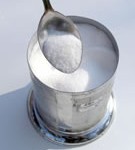24
May 10
I know that you’re looking to get into your swimsuit or even just shorts and short sleeves this summer. I wanted to share with you my single best piece of advice in order to fast track you into your bikini.
While this advice is sound, you may have a hard time swallowing it.
Sugar….who’d a thunk? Sadly, it can be your worst diet enemy.
Sugar comes in many forms, here’s a list of other names for sugar:
barley malt
beet sugar
brown sugar
buttered syrup
cane-juice crystals
cane sugar
caramel
carob syrup
corn syrup
corn-syrup solids
date sugar
dextran
dextrose
diastase
diastatic malt
ethyl maltol
evaporated cane juice
erythritol
fructose
fruit juice
fruit-juice concentrate
glucose
glucose solids
golden sugar
golden syrup
grape sugar
high-fructose corn syrup
honey
invert sugar
lactose
malt syrup
maltodextrin
maltose
mannitol
molasses
raw sugar
refiner’s syrup
sorbitol
sorghum syrup
sucrose
turbinado sugar
yellow sugar
What could possibly be wrong with sugar and its derivates? Why would I pick on sugar?
Good questions. Fact is, there’s really nothing wrong with sugar, it’s the quantity of consumption that’s in question. If you start to read labels, you’d be surprised to see that sugar is added to literally every food item, even in foods that you wouldn’t expect to find sugar. The average North American diet consists of 20 teaspoons of added sugar daily. This is a lot especially when you consider this doesn’t count naturally occurring sugars found in food.
According to the World Health Organization, no more than 10 percent of calories should come from added sweeteners. In a diet composed of 2,000 daily calories, that would amount to about 200 calories, or 50 grams of sugar.
Sugar is an addictive substance. Once you taste something sweet, you crave more. The more sugar you ingest, the more sugar you want. You’ll you lose your taste for naturally occurring sugars when you eat intensely sweeten foods.
Here are a five of the obvious detrimental things that sugar does to your body:
- Refined sugar contains no fiber, no minerals, no proteins, no fats, no enzymes, only empty calories. When you eat sugar, your body must borrow vital nutrients from healthy cells to metabolize it. Calcium, sodium, potassium and magnesium are taken from various parts of the body to make use of the sugar. Calcium is used to neutralize the effects of sugar so sometimes the body draws this from the bones. Bones can then become osteoporotic.
- If sugar consumption is continued, an over-acid condition results, and more minerals are needed from deep in the body to correct the imbalance. In essence, the pH of the body isn’t balanced.
- Sugar makes the blood very thick and sticky, inhibiting much of the blood flow into the minute capillaries that supply our gums and teeth with vital nutrients. This can lead to diseased gums and dental problems.
- The pancreas overreacts to large amounts of sugar in the blood and releases too much insulin. This can lead to diabetes.
- Refined sugar may be one of the major dietary risk factors in gallstone disease. Gallstones are composed of fats and calcium. Sugar can upset all of the minerals, and one of the minerals, calcium, can become toxic, depositing itself anywhere in the body, including the gallbladder.
So what’s a girl to do? Well, your best bet is to become aware of all the places sugar hides and then try to reduce your consumption. Over time you’ll develop a taste for naturally occurring sugars. If you try to cut out sugar, you’ll likely experience some withdrawal symptoms. You’ll have crazy cravings and may feel sluggish and have a headache. After 4-5 days though, this will pass.
It’s easy to figure out your sugar consumption by reading food labels. The best way to visualize sugar content is to take the carbohydrate count and divide it by four. For example: if a serving size has 28 g of carbs, then that would amount to 7 teaspoons of sugar. Your goal should be to limit sugar consumption to a serving size of no more than 4 teaspoons of sugar or 16g of carbs at a time. Try to keep refined and process sugars out of your diet completely.
Give your diet a good hard look and cut back on sugar where you can at the very least. Cutting it out completely may be too much of a step to start. Baby steps and stay on track and your body will thank you in the end.
To me, cutting back on sugar is a great way to get bikini ready.




 My passion is teaching people how to work fitness into their daily lifestyle in order to improve their quality of life. Let’s work together to help you reach your fitness goals!
My passion is teaching people how to work fitness into their daily lifestyle in order to improve their quality of life. Let’s work together to help you reach your fitness goals!
great info ty
I have tried and failed many times to cut back on sugar. I am a sugar addict and no matter how hard I try I cannot stay away from sugar. After having sugar I crave salt. It’s a never ending cycle.
Thank you. This is very good advice! Very helpful and easy to understand.
@Ann-I know how this cycle goes. Are you eating a nutritionally dense diet? This will really help cut back on cravings. If you fill up on the ‘good stuff’, then once you get through the first week of crazy cravings, it WILL get easier. Hang in there!
I am living in Namibia. Just turned 50. For so long I was looking for a site for the over 40’s as it his quite hard to loose weight at this age. I’ll be starting to go to the gym together with my daughter at the beginning of June.
My problem….. I drink a lot of coffee with 2 teaspoons of sugar. How much sugar are allowed each day ?
I have Celiac Disease, Meniere’s Disease, and Crohn’s. I have removed so much from my diet including sugar, salt, soy, Lactose, whey, casein, beans, red meat and all grains, Gluten Free also. At first I lost the weight I had gained while sick, now my body is “hoarding” everything I eat. Any suggestions?
Thanks for the reminder. There are so many trick names with sugar. That’s why I read every single label b/c manufacturers are very tricky. I also don’t use or eat any refined sugar. I use splenda. Yes, there’s controversy about these, but they are all inconclusive as some doctor say certain ones are harmful and other doctors say they are safe.
In my opinion, splenda, stevia are still better than all of these refined sugars that you listed 🙂
Thanks for a good article.
Gud information,I have tried very hard to get lean but never reached my target.Looking so closely I realised this could be the reason.Thanks for making it so clear.
She is right Ann, I have never felt so good as when I took sugar out of my diet. The first week was a killer, but so worth it. My mind was clear, I felt calm ! I even took out fruit for the first week, so completely cold turkey, but drink tonnes of water. It helped.
To Ann Pacheo re her sugar addiction-this may sound lame but try drinking water, better yet lemon water, when you crave sweet or salty. Hydrating really does help. I feel your pain!
Sue, Thanks for sharing your strategy. I always try to drink water first before I reach for food, especially when I crave sugar. Often I think I’m hungry but I’m really just thirsty and this does the trick!
Good for you Erica. Agreed, stay the course for the first week, that’s the hardest! After that you’ll start to feel the benefits of cutting sugar out!
JC, My choice between splenda and stevia would be stevia because it’s a natural sweetener. I would rather have a small amount of stevia that sugar any day. One thing to be careful of with artificial sweeteners is that you develop a strong taste for overly sweet things and naturally sweet fruits don’t taste as good. So, my advice is to limit sweeteners and go for natural flavors. You’d be surprised how the palate adjusts. Thanks for sharing your strategy!
Wow Carol, you have more to deal with than most. I think my biggest concern is that you can find things to eat on a regular basis. Feed your body and metabolism regularly. I also think that your issues maybe outside the scope of my help and a nutritionist may be in order. I’m all for finding the support you need and if I can’t offer it, I highly recommend the Simply for Life program or something similar. Nutritionists there will help you find supportive foods that will keep your metabolism firing and you’ll feel energized and not hoard those extra pounds.
Handelene, You’d be surprised at how that small amount of sugar can add up. For example, 2 tsp of sugar has 8 g of carbs and 30 calories. If you have four cups of coffee with sugar a day, that adds an extra 120 calories a day to your diet without any added nutrients. Over the course of the week, this is an extra 840 calories, in a month an extra 3780 calories and over the year an extra 45 360 calories. A pound consists of 3500 calories, so you could be adding an extra 13 pounds of fat to your frame over the course of a year for those teaspoons of sugar. Conversely, you could easily drop those 13 pounds without even being hungry, by only dropping the sugar in your coffee.
So, it comes down to how much to you do you want to lose weight? Do you like the sugar in your coffee more than the idea of dropping 13 pounds in a year? Is there room for compromise here? I hope that puts things into perspective a little for you.
I’m trying hard to give up my evening cravings for chocolate chips. It really is an addiction! thanks for the great post Shawna
High praise from you Jill!
Maybe you’ve already said this on a previous blog but what is your view of artificial sweeteners? I’ve heard they can make one crave sweet substances but are they or are they not an acceptable substitute for sugar?
Tracy, go here to read more about artificial sweeteners. Thanks for your comments.